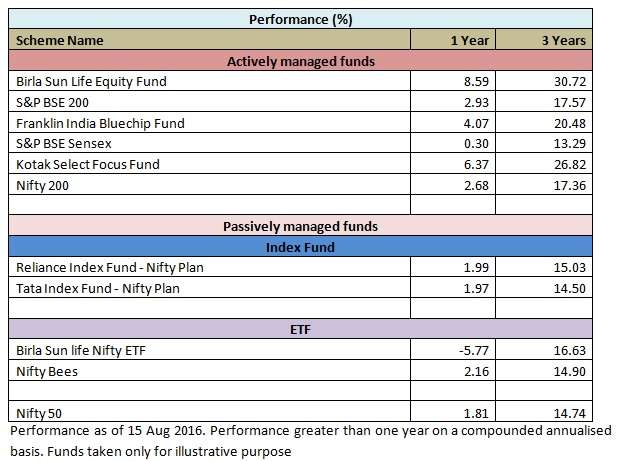Some of you ask us whether ETFs or index funds are a better option to mutual funds. We tell you that in the Indian context actively managed mutual funds have performed better than passively managed funds or ETFs. But what exactly does that mean? Active and passive management are simply styles of investing. The latter simply mimics an existing index while the former does a lot more. Let’s discuss these styles of management in this article.
Active management
In active management, the fund manager seeks to pick stocks with the aim of beating the benchmark and generating alpha. A fund manager cannot possibly invest in the same stocks as the/she has to take a call on picking stocks outside the index or keeping the exposure of sectors different from the index. Similarly, when the fund manager deems fit, he can raise cash or move some assets to money market instruments if he finds the markets are over-valued or too volatile.
Passive management
A fund is passively managed if the fund manager replicates the index with exactly the same stocks and in the same proportion. Here the fund manager is trying to replicate the index performance with as little tracking error (we will have a post on tracking error soon. Suffice to say that it refers to the deviation of the performance of the fund from its benchmark) as possible. Since the fund manager has to mimic the index he will have very little cash and that too, only to meet redemption proceeds. Index funds and ETFs are examples of passively managed funds. While ETFs are traded in the stock exchanges and can be bought through a demat and brokerage account, index funds can be bought like any other mutual fund. We will now look at how these categories of funds vary in their characteristics:
Expense ratio: Passively managed funds sport a lower expense ratio as these funds need less management, given that they simply have to mimic the index. Identification of right stocks and sectors and opportunities are not needed with passive fund management. On the other hand, an actively managed fund will require a team of analysts and fund managers who will study the various parameters of the economy and take calls on sectors and stocks in order to generate higher returns.
Turnover ratio: Turnover ratio in an actively managed fund will be high compared to a passively managed fund. This is so since a lot of active stock calls are taken continuously in active management while in a passively managed fund, the churn is only when there is a change in a stock in the index or when the fund has huge inflows and the same needs to be deployed in the index stocks.
Performance and volatility : Though in actively managed funds the fund manager aims to create alpha there is also a possibility that the fund may underperform the benchmark if its calls go wrong. Active management also at times lead to higher volatility in returns compared with benchmark. Since a passively managed fund mirrors its benchmark in every aspect, the possibility that the fund may underperform its index by a huge margin is low. At best the return differential could arise as a result of tracking error.

Active funds would generally score over passive funds in terms of the flexibility and diversification they offer. You can choose funds from different marketcap segments or funds using different strategies (such as growth or value). You can also choose funds with a combination of equity and debt or those that invest based on market valuations. On the contrary, passively managed funds offer little choice in the Indian context. There are very few index funds/ETFs that are based on mid cap indices and none exists in the small cap space. Nor is there is a fund that will invest in a combination of asset classes. You cannot also have a passive fund reducing its equity allocation or upping it based on market valuations.
Under unforeseen scenario such as 2008 or 2002 market crash, actively managed funds can sell the stocks in the fund and move the money to cash or money market funds to prevent further erosion of investment. While passively managed funds such as index funds and etfs will not be able to do so. In inefficient markets like India where there information dissemination is asymmetric and not all information regarding the stocks and markets are available to all, at all times, well managed active funds tend to outperform the markets, handsomely generating alpha. For those wanting to build wealth for the long term, actively managed funds do a better job than passive funds.









Currently market moving upside so is it good time to invest in MF or i should wait for market downside?
In march when market went down i have invested in some MF which are is in good state now.
Hi Jyoti, timing the market is a very difficult thing and not advisable. In case you are worried about the markets kindly do SIPs which help you to average out or if you have lumpsum, you can park it in a debt fund and do a STP.
Currently market moving upside so is it good time to invest in MF or i should wait for market downside?
In march when market went down i have invested in some MF which are is in good state now.
Hi Jyoti, timing the market is a very difficult thing and not advisable. In case you are worried about the markets kindly do SIPs which help you to average out or if you have lumpsum, you can park it in a debt fund and do a STP.